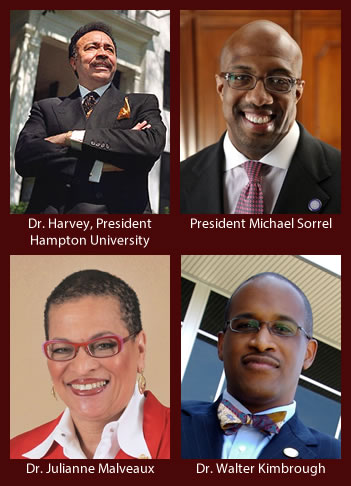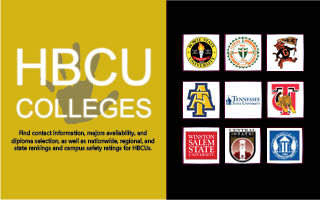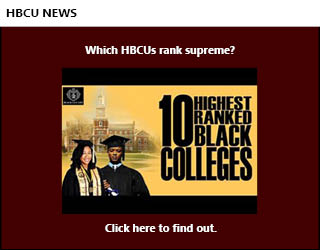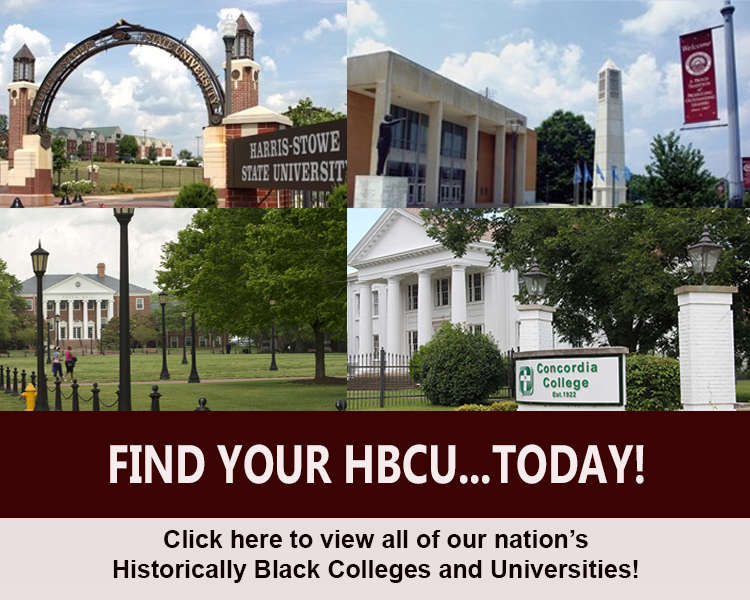A Few HBCU Leaders You Should Get To Know
- Details
- Written by John Fleming III
For centuries the growth of cultures and civilizations has come down to how they have adapted to change and who has led them through these changes. During times of uncertainty, there is a trait within leaders that makes you believe that the impossible is possible, that the unjust can become lawfully intolerable, that dreams can become reality. Or it may serve to simply remind us that "Yes, We Can."
And as you know, the world has witnessed many of these great leaders in several different forms and at several different periods within modern-day history. Many leaders that have proven to be revolutionaries are still today held in high regard and continue to inspire many others to help make dramatic changes in society. Visionaries like Gandhi who inspired non-violence as the best way to fight injustices and Martin Luther King who masterfully used these techniques during the Civil Rights Movement. Oprah Winfrey who decided that not only was a black women going to be a media star, but the biggest media super-mogul ever seen. Leaders such as Bob Marley and Jimi Hendrix who decided to dance to a different tune, and the world decided to dance along without the prejudice of color. George Washington Carver who decided that he wanted more from his peanuts... so he decided to make peanut butter.
Today is no different than before. And while it may be a difficult task to outpace some of these contributions, there are still individuals making conscious decisions to try. Efforts that in some form or fashion are making heads turn and people follow. This is the time for us to take notice and then take notes of the type of leaders that are currently entrenched within our Historically Black Colleges and Universities.
Now here is something that you may not know and a few people that you should become familiar with.
What if I told you that you could go to a school where the president is also known as the "Hip-Hop President" and has proudly introduced a successful campus series called "Bless The Mic" that has been duplicated across other campuses? His name has been listed amongst President and Mrs. Obama, Jay-Z, Michael Jordan and Tom Joyner (to name a few) as a person who is making an impact and is a top influencer within the African American community.

As one of the nation's youngest school presidents, Dr. Walter Kimbrough, who gave Philander Smith College prominent news headlines throughout the country and a new image to boot, is now positioned to do the same at Dillard University in New Orleans, La. Upon becoming the 12th president of Philander Smith in 2007, Dr. Kimbrough introduced a new lecture series aimed at reaching out to the community called "Bless The Mic," which has since seen such diverse notable speakers as Common, Gabrielle Union, Roland Martin, James Carville and Dr. Cornel West. Giving typical presidents' lectures a contemporary spin has reaped dividends as students no longer fall asleep while taking notes, but rather listen intently as subjects of interest are spoken of by people that they regularly see in the news or media. Getting an opportunity to see these stars in person regularly throughout the school year has become almost as commonplace as seeing Dr. Kimbrough utilize social media platforms to talk to students, alumni, faculty and the public alike. That's right, as you would expect the Hip Hop President has a strong Twitter fan base (@HipHopPrez) and was cited by bachelorsdegree.com in 2010 as a top 25 school president you should follow. However, his deeds aren't only evident on the mic. During his tenure at Philander Smith, Dr. Kimbrough increased retention rates from 50 percent to almost 80 percent, making it second in the state of Arkansas behind only the University of Arkansas. Dr. Kimbrough was once quoted as saying that his efforts are aimed at making "education relevant for young people." These efforts are clearly an indication that this leader is on the right track. Beginning his post on July 1, 2012, Dr. Kimbrough will take his leadership to Dillard University and become their seventh president. In a press release issued by the school, board chair Joyce M. Roche stated that "The depth of Dr. Kimbrough's dedication to students is inspiring. He is successful because he puts students' success above all else." (www.dillard.edu).This is undoubtedly a quality of a leader.
This six letter word is intolerable. _ _ _ _ _ R. It evokes extreme emotion. _ _ _ _ E R. It has penetrated the core of millions of individuals and families. _ _ _ C E R. It has changed the landscape of society and been the subject of very in-depth conversations. _ _ N C E R. And if you are at "home" then you better watch how you use it and what you say about it. _ A N C E R. This "home" is Hampton University's "Home By The Sea" in Hampton, Va., and President Dr. William Harvey has sought to reverse the intolerable, remove the emotion, comfort individuals and families and address these conversations about CANCER in a very ambitious way.
Beginning as a vision in 2005 after having a conversation with an alumnus about new groundbreaking methods of treating cancer, Dr. William Harvey decided that he would help lead an effort that could have an extremely powerful impact on those in the community and beyond. On October 21, 2010, the Hampton University Proton Therapy Institute (HUPTI) at Hampton University officially made its grand opening. Standing at 98,000 square feet, HUPTI is the 8th such advanced treatment center and the largest free-standing proton therapy center in the world.
Just what are we talking about here? Proton therapy is regarded as the most precise form of cancer treatment available as it targets and kills tumors with millimeter accuracy, while sparing surrounding healthy tissue, leaving the patient with minimal to no side effects, unlike conventional radiation therapy, which is especially important for growing pediatric patients. One of HUPTI's first patients Jacob was a child stricken with a rare form of cancer that paralyzed him from the waist down overnight. His family traveled over 1,500 miles to Hampton University where he received the proton therapy treatment that not only saved his life, but gave him back a healthy and active childhood. During the official grand opening, Jacob was present and running around as any normal child would do. The HUPTI facility has the capability of treating over 2,000 patients like Jacob every year. (www.hamptonproton.org/).
This is most certainly not the first time Dr. Harvey has made headlines with pioneering efforts established at Hampton University. Shortly after President Obama was elected the country's 44th president and first African-American president of the United States, he accepted an invitation from Dr. Harvey to give the 140th commencement speech to the graduating class of Hampton University for 2010. Sometimes shaking hands with the president of the United States can be considered enough, but for Dr. Harvey there seems to be a consistent stream of visionary thought that is inherently rooted within his leadership.
Dallas, Texas is home to the NFL's world-famous Dallas Cowboys, and football in this state is almost like a religion. Standing on the sidelines of one football field, which is only a stone's throw from downtown Dallas, brings about thoughts of hard hits on top of landscapes that have been painstakingly manicured each day of the week. Indeed this field has a goal post, but it also has corn growing on it too! President Michael Sorrell is a Cowboys fan, but at Paul Quinn College in Dallas, Texas, there is no football being played on his field. Two acres of farm is all the gridiron action you are going to get as the cabbage fights for room against the broccoli and tomatoes. Paul Quinn is providing a true "go-green" effort in providing the community with its only local source of quality food in partnership with corporate partner PepsiCo, which is also based in Dallas.
Called the Food for Good Farm, this is only one of several drastic changes that Mr. Sorrell has implemented after taking the leadership position at Paul Quinn in 2007. With a master's and a law degree, Mr. Sorrell enjoyed professional success as a lawyer and also worked for President Bill Clinton's administration in the White House as special assistant in the executive office. It's fair to mention that when he took the job at Paul Quinn, where he is known affectionately as Prez, he took a significant pay cut, according to the New York Post. At the time, Paul Quinn was caught in a downhill spiral only to be pulled out by Mr. Sorrell with drastic changes such as the Food for Good Farm, overhauling staff and faculty, injecting new funding measures, re-establishing the school's accreditation and the beginning phases of new on-campus construction.
As exhausting as this may all sound, Mr. Sorrell has Paul Quinn headed in a new direction and as a true leader with people taking notice. Written about in the New York Post, Mr. Sorrell and Paul Quinn have received numerous accolades including the HBCU of the Year award from HBCU Digest and the leadership award from T.R.A.C.S. Mr. Sorrell is known to not only care about his students, but to also develop personalized approaches for supporting his students individually. Such is the case for a young student who the New York Post reported as having a homework assignment of reciting a poem to him every week. Her latest:"To an Athlete Dying Young," by A.E. Housman. She got through it but expressed doubts about doing another the following week. Prez insisted. "Thank You," she said. "I don't know why you're doing this, but I know I will someday." Take notice of Mr. Sorrell and like this student, you will also know why someday.
Over the past few years the United States has gone from bordering on another Great Depression to just a moderate recession to another recession. Many jobs and houses have been lost. The automotive industry almost went belly-up. Banks had to be loaned money to stay open. You heard that correctly. Banks had to borrow money to stay open. People adopted the mantra of "by any means necessary" in order to survive in an extremely tough financial crisis. So what do we do about it?
"Not only must the federal government be involved in job creation, but the private sector must be offered incentives to be a part of this solution. We have a rich tradition of federal involvement in job creation, ranging from the Depression-era Works Progress Administration (WPA) to the JTPA (Job Training Partnership Act) of the 1980's. There are unmet needs in public infrastructure, in health care, and in social services. Creating 5 million jobs at $50,000, with benefits and administrative costs would run us $500 million, and would reduce the unemployment rate by about 5 percent, and would increase tax revenue significantly. ...It would be my recommendation that employment funds flow to cities, not state, as urban issues are far more acute than state-wide issues, and because cities are more likely to be blacker, browner, older, younger, and both richer and poorer than the rest of America. The economic bifurcation we see in cities is likely to be one of the reasons we see such strong Occupy movements in urban areas."
How does that sound to you? Sounds like a solution the president himself would give to the nation and then take measures to pass it along in Congress. The only correction here is that this was not the president of the United States, but rather the then-president of Bennett College during a speech she gave to the Congressional Progressive Caucus in 2011. Dr. Julianne Malveaux was described by Dr. Cornel West as the "most iconoclastic public intellectual in the country." As the 15th president of Bennett College for Women, she was known and respected for her progressive insightfulness of current and historical economic and socioeconomic trends. Dr. Malveaux appeared on CNN, BET, PBS, NBC, ABC, Fox News, MSNBC, CNBC and C-Span, just to name a few. While at Bennett, she injected global understanding, leadership, and entrepreneurship into the school's curriculum, developing her students into global citizens and twenty-first century contributors. Taking notes, it would be no surprise to see additional speeches from Dr. Malveaux from a more esteemed position of power at the White House in the not too distant future.
While this article lists only a handful of leaders that currently exist within the HBCU landscape, it is important to note that there are many more with equal stories of interest. Just as these schools themselves serve as a foundation for developing leadership, it is important to understand that these beacons of light (HBCUs) continue to attract some of the brightest and most influential leaders of today. Take notice of those who are more accessible through higher education at these colleges and universities. Every leader mentioned here has a core vision of inspiring others to make dramatic changes personally and within society. Your inspiration or contribution may be just one semester away.





